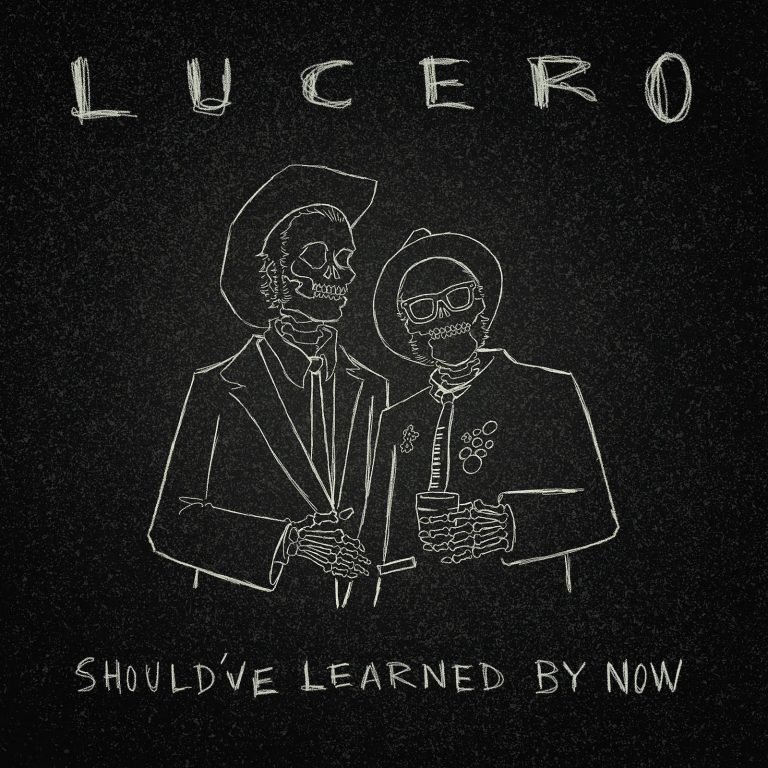When you’re drunk, the future can suddenly seem non-existent or at least entirely unimportant. Everything there is to live for suddenly seems as if it is contained within that one night. It’s this feeling that inspires the wild abandon, recklessness and spiraling morning-after regret that ensues. It’s a hazy, precarious state of being that Memphis country-punks Lucero have spent nearly a quarter century mining with expert precision. It’s one that they return to on their 12th LP Should’ve Learned By Now – whose very title alludes to a reversion to this tried and true subject matter. Though far from being a retread, Should’ve Learned bears some of the most evocative and affecting music of the quintet’s output thus far.
Though not expressly billed as such, Should’ve Learned is a loose concept album tracing a drunken night out – from the false resolve of its beginning, the visceral emotional intensity of its peak (or nadir, depending on your perspective) to its resolute, worn out end. The sound of a cowbell being banged opens up the album on “One Last F.U.”, before Ben Nichols grounds the song in a very familiar setting (“Ain’t no use in staying / Even though the band’s still playing / For a graceful exit ain’t no better song”). The stadium-sized country rocker is a fantastic exercise in self-delusion, as our narrator tries to convince himself he won’t fall back into old habits and will leave after just one more drink. Of course, when Nichols sings “I ain’t gonna be here very long”, one minute into the album’s runtime, we all know things are going to play out differently – Nichols’ whiskey-soaked voice alone is testament to such.
Sure enough, reckoning follows on the sorrowful “Macon If We Make It”. “It’s Macon if we make it / Savannah if we drown”, cries Nichols in the chorus, but any sense of hope is momentary, as Nichols confirms the latter path in the immediate next lyric; “The bar starts to sink”. The song instantly ranks among the band’s greatest and most anthemic – the driving guitars, the intoxicating bass riff embedding it with a sticky melody and a sense of heightened stakes. The catastrophic hurricane imagery only adds to the sense of melodrama but the song’s most powerful moments derive from its stark, solemn confessions; “It’s understood / I’ll never be well and good”.
That the subject matter of these songs is the same as that which the band have been exploring for two decades leads to a sense of time collapsing in on itself. Lucero alternates between current-day dispatches from the bar to nostalgic recollections of such times many years ago – and sometimes it’s unclear where one ends and the other begins. In less capable hands, this would result in an album that sounded like a tired rehashing of past glories, but the dynamic, heartfelt performances of all band members here instead ensure that it embeds the songs with ample charm and an air of timelessness.
“At The Show” is Should’ve Learned at its warmest and most nostalgic; transporting us back to a time where the band were “kids… playing at the shows on the weekends”. The song is a testament to the joys of live music, but at its center is the story of a boy desperately trying to get the attention of a girl; “Maybe she’ll be at the show tonight”. The song twitches and glows with all the nervous energy and seemingly endless hope of young love, while Nichols’ lived-through voice draws contrast between past aspirations and present realities; infusing an aching bittersweetness into the music.
Most of Should’ve Learned is loud, imposing and thrilling; all driving bass guitar, power chords, thrashing drums and powerhouse vocals. It’s an appropriate sonic mode for an album centered around drunkenness – a state where few things are felt quietly or subtly – and leads to infectious anthems like “One Last F.U.” or “Buy a Little Time”. The latter finds our narrator trying to repair a broken relationship (“I let her down but I could make it up / I just need a little time”) while a bar fight simultaneously brews in the background. The imposing arrangements and loud-quiet dynamic of Rick Steff’s understated piano playing versus Nichols’ and Brian Venable’s guitar shredding mirror the tension displayed in the lyrics and inject a sense of urgency and even panic into this album highlight.
That said, some of the album’s most revealing and aching moments arrive in surprisingly subdued tones (at least compared to the band’s usual mode of operating). The penultimate “Drunken Moon” is an affecting waltz chronicling a drunk walk home – a simple descending piano line patiently moves the song forwards and Jessie Davis and Cory Branan provide harmonies as Nichols sings of being guided “by the light of a drunken moon”. Suddenly a simple drunk walk home takes on almost spiritual significance. On the following “Time to Go Home”, Nichols sings plainly, directly and lovingly: “Before I even met you / It was you I was looking for”. It’s a surprise moment of emotional clarity emerging within a drunken haze – a reminder that even amidst our most desperate and directionless moments in life, we’re capable of discovering revelations.

